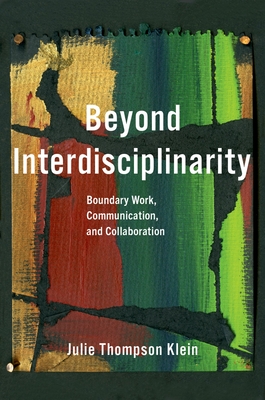Beyond Interdisciplinarity is the first book to present a conceptual framework for thinking about inter- and trans-disciplinary as well as cross-sector boundary work. The approach in this book accounts for the dynamics of communicating, collaborating, and learning across disciplines.
Beyond Interdisciplinarity examines the broadening meaning of core concept across academic disciplines and other forms of knowledge. In this book, Associate Editor of The Oxford Handbook of Interdisciplinarity and internationally recognized scholar Julie Thompson Klein depicts the heterogeneity and boundary work of inter- and trans-disciplinarity in a conceptual framework based on an ecology of spatializing practices in transaction spaces, including trading zones and communities of practice. The book includes both "crossdisciplinary" work (encompassing multi-, inter-, and trans-disciplinary forms) as well as "cross-sector" work (spanning disciplines, fields, professions, government and industry, and communities). The first section of the book defines and explains boundary work, discourses of interdisciplinarity, and the nature of interdisciplinary fields. In the second section, Klein examines dynamics of working across disciplines, including communication, collaboration, and learning with concrete examples and lessons from research projects and programs that transcend traditional fields. The closing chapter examines reasons for failure and success then presents gateways to literature and other resources. Throughout the book, Klein emphasizes the roles of contextualization and historical change while factoring in the shifting relationship of disciplinarity and interdisciplinarity, ascendancy of transdisciplinarity, and intersections with other constructs including Mode 2 knowledge production, convergence, team science, and postdisciplinarity. The conceptual framework she provides also includes the role of boundary objects, agents, and organizations in brokering differences and creating for platforms for change.Klein further explains why translation, interlanguage, and a communication boundary space are vital to achieving intersubjectivity and collective identity. They foster not only pragmatics of negotiation and integration but also reflexivity, transactivity, and co-production of knowledge with stakeholders beyond the academy. Rhetorics of holism and synthesis compete with instrumentalities of problem solving and transgressive critiques. However, typical warrants today include complexity, contextualization, collaboration, and socially-robust knowledge. Crossing boundaries remains complex, but this book guides readers through the density of pertinent literature while expanding understandings of crossdisciplinary and cross-sector work.
Get Beyond Interdisciplinarity by at the best price and quality guranteed only at Werezi Africa largest book ecommerce store. The book was published by Oxford University Press Inc and it has pages. Enjoy Shopping Best Offers & Deals on books Online from Werezi - Receive at your doorstep - Fast Delivery - Secure mode of Payment
 Jacket, Women
Jacket, Women
 Woolend Jacket
Woolend Jacket
 Western denim
Western denim
 Mini Dresss
Mini Dresss
 Jacket, Women
Jacket, Women
 Woolend Jacket
Woolend Jacket
 Western denim
Western denim
 Mini Dresss
Mini Dresss
 Jacket, Women
Jacket, Women
 Woolend Jacket
Woolend Jacket
 Western denim
Western denim
 Mini Dresss
Mini Dresss
 Jacket, Women
Jacket, Women
 Woolend Jacket
Woolend Jacket
 Western denim
Western denim
 Mini Dresss
Mini Dresss
 Jacket, Women
Jacket, Women
 Woolend Jacket
Woolend Jacket
 Western denim
Western denim
 Mini Dresss
Mini Dresss






























































